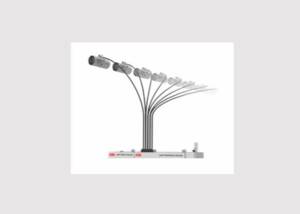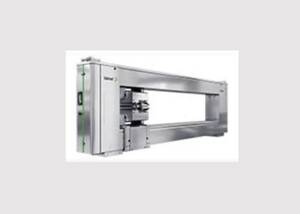Cord machines as useful and sustainable helpers in shipping
News General news
Rising raw material and energy prices as well as legal requirements are increasing the pressure on manufacturers, suppliers and processors to implement solutions in their processes that are both sustainable and economical. In addition to ecological packaging design, the use of cord machines also offers great potential. Compared to conventional strapping machines, this technology uses no plastic at all, opens up a wide range of applications and is a real alternative, not least because of its fast and cost-effective processing. Antalis Verpackungen GmbH therefore advises its customers specifically on how they can utilise the versatile application options and advantages of machine strapping in their supply chain.

Choosing the right packaging products and techniques plays a key role in preventing transport damage. Strapping boxes and bundling with plastic strapping is a tried and tested method for securing and sealing packaged goods and also when it comes to bundling multiple shipping units. Straps made of PP or PET are usually used in battery-operated manual strapping machines as well as in semi-automatic and fully automatic solutions. Available in different thicknesses, widths and lengths, the straps are characterised by high tear resistance, but also have less sustainable properties that require careful consideration as to whether they are actually the best possible choice in every case.
Plastic-free strapping offers many advantages
"Increasingly scarce economic and ecological resources, as well as the requirements of the European Waste Directive, have brought ecological transport and packaging solutions increasingly into focus in recent years," says Stephan Baumgärtner. The product specialist responsible for strapping and stapling at Antalis Verpackungen knows exactly what customers need and therefore advises them specifically on the many advantages of using cord machines: "In fact, this technology is the only completely natural alternative to conventional strapping and banding techniques and even offers clear advantages for certain product properties," emphasises the expert. In addition to the plastic-free sealing of cardboard boxes, parcels or magazines, the wide range of possible applications also includes special applications such as textiles. At the same time, the use of cords made from 100% recycled cotton also improves the consumer's unpacking experience and conveys a greater sense of value: "The cotton cords used not only look attractive. The knots that the machines create automatically are also very easy to open by hand without scissors or a knife," adds Stephan Baumgärtner. This means that nothing stands in the way of further use for return shipping or in the private sphere - for gardening, for example.
Wide range of applications with high efficiency
The head of the packaging machine department also recommends strapping in particular for difficult geometries and products that fall below a certain size or are too sensitive for strapping: "While a strapper requires a product width of at least 7 centimetres, 1 centimetre is sufficient for strapping. Its use also offers clear advantages where the sharp-edged plastic straps could cause pressure marks or nicks." Various versions of cord machines are also available for special requirements. These can be used to bundle long products such as bar stock or pipes quickly and easily, and the production of ring bundles for hoses, seals or stamped parts is also no problem. Another argument in favour of machine tying is the reduced time and energy required: "In contrast to strapping machines, there is no welding process or long heating times and the high processing speed of 50 cycles per minute helps to speed up the shipping process," emphasises Stephan Baumgärtner.










